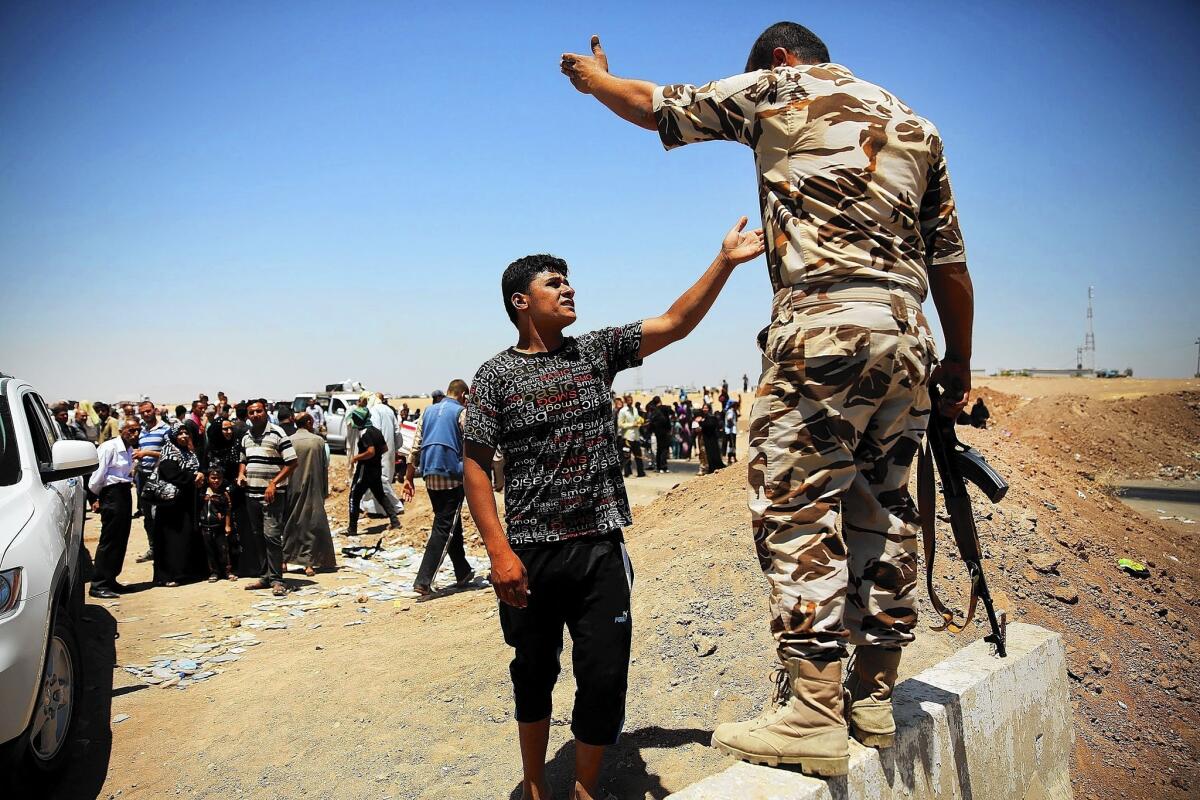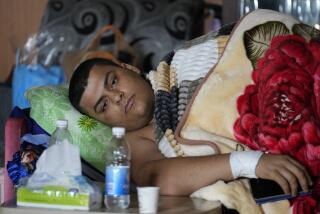In Iraq, some Kurds accuse Arab neighbors of turning against them

Reporting from SAHELA, Iraq â They knew him as Abdul Qadir, the handyman who repaired air conditioners, refrigerators, TV sets and any other busted appliances in their northern Iraqi town.
But after Islamic State forces took over the predominantly Kurdish town of Birdiya, residents learned that their pleasant, reliable Mr. Fix-It had another nickname, Haji, and was playing a senior role supervising checkpoints for the Sunni Arab extremists. He was killed Aug. 22 in a U.S. airstrike near the Mosul dam along with two other Islamic State fighters, according to Kurdish military officials.
âHe used to come to my house. He knows my family,â said Yusuf Ibrahim, who fled his home in Birdiya as the militants advanced. âAnd now we find out he wanted to kill us.â
Amid Islamic Stateâs onslaught, some ethnic Kurds who have long lived side by side with Arabs in northern Iraq are accusing their onetime neighbors of betraying them and supporting the militants.
The allegations against Haji â which were corroborated by Kurdish military commanders stationed in Sahela, on the border with Syria â mirrored claims made by Kurds, Christians, Yazidis and other minority groups who said in interviews that some Sunni Arab residents either participated as Islamic State fighters overran their towns and villages, or looted non-Arab homes and businesses after the militants took over.
It was not possible to confirm the accounts independently or to estimate accurately how many Sunnis were siding with Islamic State. Many Sunnis suspected of working with the militants no longer live among their former neighbors, in effect having disappeared into the countryside.
Many Iraqi Kurds, who make up less than 20% of the population and are concentrated in the north, question whether they can ever again live alongside Arabs, fueling fears that Islamic Stateâs rise has shattered what once was one of the Middle Eastâs most culturally diverse societies and could hasten the countryâs partition along ethnic and sectarian lines.
âWe can never forgive them,â Ibrahim said.
Although some Sunni tribal leaders vocally oppose them, the extremists enjoy support among many Sunnis who are eyeing a path back to the power they lost when Saddam Husseinâs government fell in the 2003 U.S.-led invasion. Islamic State has forged alliances with former officers from Husseinâs Sunni-led army and tribes that chafed under the Shiite Muslim-dominated government of former Prime Minister Nouri Maliki.
The arid Nineveh plains of northern Iraq have become a major battleground as the extremists seek to capture what they view as a Sunni heartland and as Kurdish leaders seek to include the oil-rich expanse in a long-sought independent state.
When the Iraqi national army fled the area during an Islamist offensive in June, the Kurdish regional government sent its soldiers, known as peshmerga, into towns and villages outside its borders, exacerbating tension with local Arab tribes.
Andy Abed, a member of a Christian militia in Qaraqosh, east of the Islamic State-controlled city of Mosul, said the peshmerga set up a strict cordon around the town and refused to allow entry to Sunni Arab residents of nearby villages. They blocked civilians seeking medical treatment, he said, deeply angering the Arabs.
One day the daughter-in-law of a Sunni Arab tribal leader went to Qaraqosh when she was in labor but was refused passage; she ended up giving birth at the Kurdish checkpoint, he said.
An Arab man who was turned away with his son, who had suffered severe burns, issued a warning to the Kurdish soldiers.
âJust wait and see what happens to you,â Abed recalled him saying. A few weeks later, he said, a mortar attack launched from one of the Arab villages forced the peshmerga to retreat, and the militants took Qaraqosh without a fight.
Gen. Mansour Barzani, a Kurdish commander, said that when U.S. airstrikes helped Kurdish and Iraqi forces oust the militants from the strategic Mosul dam area, Sunni Arab tribesmen holed up in villages opened fire on the advancing forces, killing at least two soldiers.
The Kurdish forces established a perimeter around the area and were screening Arab residents who attempted to return home. Those deemed loyal to the militants âwill not be allowed to come back,â Barzani said in an interview.
Kurdish political leaders have avoided such talk, which could be interpreted as an attempt to take advantage of the crisis to grab more territory. The president of the Kurdish region, Massoud Barzani, the commanderâs father, said after a recent meeting with Sunni tribal leaders that his forces were defending their lands and âhave never wanted to be involved in ethnic or sectarian wars.â
The Sunni leaders, for their part, pledged to âtake up arms to expel the terrorists and do their best to preserve religious and ethnic coexistence in their regions,â according to a statement from Massoud Barzaniâs office. But tribes have shown few signs of actively taking on the powerful extremists.
Many Kurds bitterly recall the 1970s, when Husseinâs Baath Party initiated a program of âArabizationâ that moved Sunni tribes into parts of Nineveh and forcibly removed Kurds from prime agricultural land. Later, Hussein was responsible for the slaughter of as many as 180,000 Kurds in the notorious Anfal campaign.
When Husseinâs government fell, Kurdistanâs semiautonomous status was made official and Kurdish leaders agreed not to seek retribution against Arab families in the north.
âThe Arabs who are fighting us and helping [the militants] are the same ones we forgave in 2003,â said Hassan Khalo, an official in Birdiya with the Barzani familyâs political organization, the Kurdistan Democratic Party.
Khalo said the party office frequently employed Haji, the repairman, and provided other Arab families with jobs and permits to work in Kurdish-controlled areas. But a few months before the Islamic State advance, one such family was implicated in a plot to detonate explosives near the party offices, he said.
After the extremists took over Birdiya, Khalo learned from villagers who remained behind that the same family had looted Kurdish homes and businesses, loading trucks full of electronics and driving off in the direction of Mosul.
In late August, when the peshmerga regained control of Birdiya, the soldiers were triumphant, waving their guns in the air in images shown on Rudaw, a Kurdish channel. A commander identified only as Ali indicated that the soldiers planned to stay.
âThe peshmerga will never leave this area,â Ali said. âThe citizens will have a happy and pleasant life here, and we will protect their freedom.â
More to Read
Sign up for Essential California
The most important California stories and recommendations in your inbox every morning.
You may occasionally receive promotional content from the Los Angeles Times.











